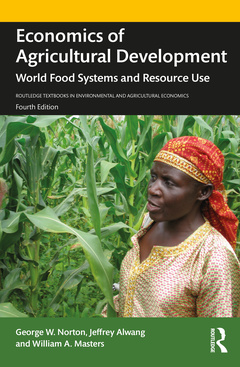Economics of Agricultural Development (4th Ed.) World Food Systems and Resource Use Routledge Textbooks in Environmental and Agricultural Economics Series
Auteurs : Norton George W., Alwang Jeffrey, Masters William A.

Economics of Agricultural Development examines the causes, severity, and effects of poverty, population growth, and malnutrition in developing countries. It discusses potential solutions to these problems, progress made in many countries in recent years, and the implications of globalization for agriculture, poverty, and the environment.
Topics covered in the book include:
- Means for utilizing agricultural surpluses to further overall economic development
- The sustainability of the natural resource environment
- Gender issues in relation to agriculture and resource use
- The contribution of improved technologies to agricultural development
- The importance of agricultural policies and institutions to development and trade
- Actions to encourage more rapid agricultural and economic development
This new edition reflects the following developments:
- Growth in environmental challenges due to climate change
- Continued progress in agricultural and economic development in many low-income
- countries while other countries and regions are being left behind
- Continued growth in demand for higher-valued farm products
This book is essential reading for undergraduate students seeking to understand the economics of agricultural development and the world food system, including environmental and human consequences, international trade, and capital flows. It contains a wealth of real-world case studies and is accompanied by a website.
Part 1 Dimensions of World Food and Development Problems; 1. Introduction; 2. Poverty, Hunger, and Health; 3. Economics of Food Demand; 4. Population and Migration; Part 2.Development Theories and the Role of Agriculture; 5. Economic Transformation and Growth; 6. Economic Development Theories and Strategies; Part 3 Agricultural Systems and Resource Use; 7. Agriculture in Traditional Societies; 8. Farming Systems and Their Determinants; 9. Resource Use and Sustainability; 10. Human Resources, Family Structure, and Gender Roles; 11. Theories and Strategies for Agricultural Development; Part 4 Getting Agriculture Moving; 12. Agricultural Research and Technology Transfer; 13. Land and Labor Markets; 14. Inputs, Finance, and Risk; 15. Pricing Policies and Marketing Systems; Part 5 Agricultural Development in an Interdependent World; 16. Agriculture and International Trade; 17. Trade Policies, Negotiations, and Agreements; 18. Macroeconomic Policies and Agricultural Development; 19. Capital Flows, Foreign Assistance, and Food Aid; 20. Lessons and Perspectives
George W. Norton is Professor Emeritus of Agricultural and Applied Economics at Virginia Tech, USA, and a Fellow of the Agricultural and Applied Economics Association. He is the author of 12 books and numerous scholarly articles.
Jeffrey Alwang is Professor of Agricultural and Applied Economics at Virginia Tech, USA, and has won several international research and outreach awards. He is the author of 14 books and more than 100 journal articles.
William A. Masters is Professor in the Friedman School of Nutrition and the Department of Economics at Tufts University, USA, and a Fellow of the Agricultural and Applied Economics Association. He is the author of numerous books and scholarly publications.
Date de parution : 08-2021
15.6x23.4 cm
Date de parution : 08-2021
15.6x23.4 cm
Thèmes d’Economics of Agricultural Development :
Mots-clés :
Exchange Rate; Human Capital; Foreign Exchange Rates; Agricultural Development; Vice Versa; Food Security; World Development Indicators Online Database; Biofuels; UN; Food Aid; Human Suffering; Agriculture; South Sudan; Sustainability; Soil Fertility; Sustainable Development; Induced Innovation Theory; Development Studies; Public Infrastructure; International Agricultural Research Centers; Family Planning Programs; Chronic; World Food Systems; Follow; World Food Situation; Trade Restrictions; Improve Information Flows; Public Extension Systems; Agricultural Pricing Policies; National Agricultural Research Systems; Marketing Margins; Export Tax; Livestock Systems; Input Price Ratio



